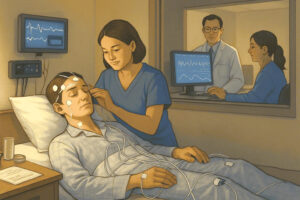Entering a sleep clinic for the very first time raises questions – perhaps even fear. When going to visit a sleep lab such as VERSAL Sleep Medicine in Cool Springs, Franklin, Tennessee, the professionals do take the time to walk you through step by step about the procedure. The sleep specialists discuss everything, answer questions, and make sure nothing on the test is a surprise. Scheduling, sensors, and privacy are handled with respect and professionalism.
What Is a Sleep Study and Who Needs It?
A sleep study, also called polysomnography, monitors what is going on in your body throughout an entire night. The test will diagnose issues like sleep apnea, restless legs syndrome, insomnia, and more. If you are snoring too much, feeling tired during the day, experiencing night-time leg jerks, or abnormal sleep, your primary care physician might suggest this sleep test.
Two types exist:
- In-lab sleep study: Gives the most personal data. Reserved for complex cases or if diagnosis is not clear.
- Home sleep study: Best if you suspect sleep apnea and have no other health issues.
You will consult both a sleep technologist – the individual who runs the test – and a physician who interprets your results.

Preparing for an Overnight Sleep Study
Get ready for it by checking through a list to guarantee that your results are accurate and that your night is quiet.
Checklist: What to Do and Bring
- Avoid caffeine or alcohol on test day.
- Bring some cozy pajamas, toiletries, and any required medications.
- Take a shower, forgo lotions-the sensors need to remain in position.
- Finish all paperwork and respond to all pre-study questions.
VERSAL Sleep Medicine provides clear instructions so nothing gets missed.

Addressing Patient Concerns and Anxieties
You’ll be in a private room. Video and audio monitoring is subtle, so no one is constantly looking at you. If you have issues with being observed or not sleeping, inform the team of that. You may get up to the bathroom or ask to have adjustments made to make things more comfortable.
What Happens During a Sleep Study Appointment
Arrival and Setup
When you arrive, you’re taken through paperwork and have your baseline health data documented. You are led to your sleeping area and met by the sleep technologist who remains with you overnight.
How Sensors Are Attached and What They Monitor?
A variety of sensors are painlessly attached:
- Scalp: EEG tracks brain waves.
- Chin and legs: Detect muscle activity and leg movement.
- Chest and abdomen: Measure breathing effort.
- Finger: Clip sensor tracks oxygen saturation.
- Nose and mouth: Record airflow.
- Chest: ECG monitors heart rhythm.
- Video and audio: Capture movements and snoring sounds.
The wires are also long enough so that you are free to move, reposition, or even stand up with support.
Comfort and Safety During Testing
If anything is uncomfortable or pinching, inform the staff immediately. High-quality data with minimal discomfort is the objective. At places like VERSAL Sleep Medicine, the technologist is always glad to assist.
Key Clinical Goals of a Sleep Study
A sleep study can reveal:
- Breathing pauses (apneas) and partial pauses (hypopneas)
- Oxygen drops
- Heart issues
- Abnormal sleep stages or movements
Common diagnoses from these measures include obstructive sleep apnea, central sleep apnea, and REM behavior disorder. They will sometimes try CPAP at night to see if it helps your breathing.
What to Expect After a Sleep Study
In the morning, the team removes your sensors and helps with any clean-up. You can shower if you like before leaving. Results are reviewed by a board-certified sleep specialist, who assesses:
- Sleep architecture (time spent in each sleep stage)
- Number of apnea events
- Oxygen levels
- Heart and movement data
You typically receive your results within two weeks and meet with your doctor to discuss next steps.
Interpreting Sleep Study Results and Next Steps
Your report covers important findings such as how well you slept, how often you stopped breathing, and your lowest oxygen readings. Your doctor uses all this to suggest treatment – such as CPAP for apnea, medication, or sleep hygiene adjustments. Ask for questions and get a copy of your report.
Making the Most of Your Sleep Study
- Follow pre-study advice: Avoid caffeine, keep taking your regular medications unless told otherwise, and go to bed at your normal time.
- Speak up: If something feels wrong or you’re not sure about directions, say so.
- Stay involved: After your results are ready, discuss treatments, equipment selection, and follow-up visits. VERSAL Sleep Medicine is committed to clear communication, so you never have to guess what comes next.
New advances in sleep medicine include advanced wireless sensors and improved at-home testing. Patient feedback keeps driving more comfortable, accurate, and quicker testing either at home or in the clinic. Always be proactive about your sleep health, ask any questions when you have, and trust your care team to help you rest better for years to come.
Looking for personalized guidance for your sleep study journey? VERSAL Sleep Medicine in Cool Springs, Franklin, Tennessee offers up-to-date care and genuine support for every step – all to help you rest easier and breathe better.
